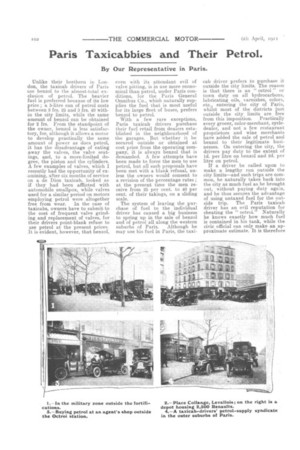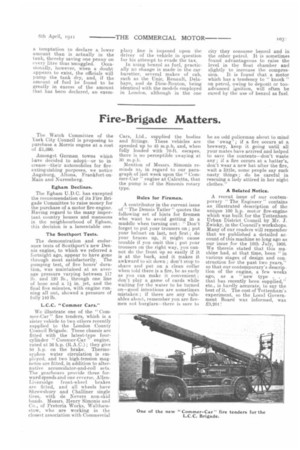Paris Taxicabbies and Their Petrol.
Page 14

Page 15

If you've noticed an error in this article please click here to report it so we can fix it.
By Our Representative in Paris.
Unlike their brethern in London, the taxicab drivel's of Paris use benzol to the almost-total exclusion of petrol. The heavier fuel is preferred because of its low price ; a 5-litre can of petrol costs between 3 frs. 25 and 3 frs. 40 within the city limits, while the same amount of benzol can be obtained for 2 frs. From the standpoint of the owner, benzol is less satisfactory, for, although it allows a motor to develop practically the same amount of power as does petrol, it has the disadvantage of eating away the valves, the valve seatlugs, and, to a more-limited degree, the piston and the cylinders. A few examples of valves, which I recently had the opportunity of examining, after six months of service on a de Dion taxicab, looked as if they had been afflicted with automobile smallpox, while valves used for a similar period on motors employing petrol were altogether free from wear. In the case of taxicabs, owners have to submit to the cost of frequent valve grinding and replacement of valves, for their drivers point-blank refuse to use petrol at the present prices. It is evident, however, that benzol,
even with its attendant evil of valve pitting, is in use more economical than petrol, under Paris conditions, for the Paris General Omnibus Co., which naturally supplies the fuel that is most useful for its large fleet of buses, prefers benzol to petrol.
With a few rare exceptions, Paris taxicab drivers purchase their fuel retail from dealers established in the neighbourhood of the garages. But whether it be secured outside or obtained at cost price from the operating company, it is always benzol that is demanded. A few attempts have been made to force the men to use petrol, but all such proposals have been met with a blank refusal, unless the owners would consent to a revision of the percentage rates ; at the present time the men receive from 25 per cent. to 40 per cent. of their takings, on a sliding scale.
The system of leaving the purchase of fuel to the individual driver has caused a big business to spring up in the sale of benzol and of petrol all along the western suburbs of Paris. Although he may use his fuel in Paris, the taxi cab driver prefers to purchase it outside the city limits. The reason is that there is an " octroi " or town duty on all hydrocarbons, lubricating oils, varnishes, colors, etc., entering the city of Paris, whilst most of the districts just outside the city limits are free from this imposition. Practically every grocer, color-merchant, cycledealer, and not a few restaurant proprietors and wine merchants have added the sale of petrol and benzol to their legitimate businesses. On entering the city, the drivers pay duty to the extent of id. per litre on benzol and 2d. per litre on petrol.
If a driver be called upon to make a lengthy run outside the city limits—and such trips are common, he naturally takes back into the city as much fuel as he brought out, without paying duty again, and he thus secures the advantage of using untaxed fuel for the outside trip. The Paris taxicab driver has an evil reputation for cheating the " octroi." Naturally he knows exactly how much fuel is contained in his tank, while the civic official can only make an approximate estimate. It is therefore
a temptation to declare a lower amount than is actually in the tank, thereby saving one penny on every litre thus smuggled. Occasionally, however, when a doubt appears to exist, the officials will pump the tank dry, and, if the amount of fuel be found to be greatly in excess of the amount that has been declared, an exem plar) line is imposed upon the driver of the vehicle in question for his attempt to evade the tax. In using benzol as fuel, practically no change is made in the carburetter, several makes of cab, such as the Unic, Renault, Delalia,ye, and de Dion-Bouton, being identical with the models employed in London, although in the one city they consume benzol and in the other petrol. It is sometimes found advantageous to raise the level in the float chamber and slightly to increase the compres sion. It is found that a motor which has a tendency to " knock " on petrol, owing to deposit or tooadvanced ignition, will often be cured by the use of benzol as fuel.




















